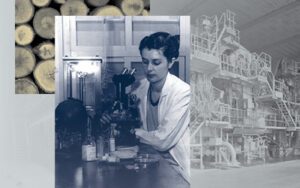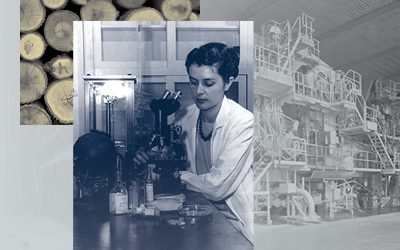
When you hear “chemical engineer,” what comes to mind? Someone in a lab coat mixing dangerous chemicals? Think again. Chemical engineering is one of the most dynamic, diverse, and impactful fields in engineering today — and women have been at the forefront of innovation in this field for nearly a century.
This November, we’re celebrating the incredible contributions of women in chemical engineering and the pulp and paper industry, particularly those working to build a more sustainable world. Their stories challenge common misconceptions about what chemical engineers actually do and showcase why this field — especially within the pulp and paper industry — is more exciting and relevant than ever.
Margaret Hutchinson Rousseau: The Trailblazer (1910-2000)
Imagine stepping into an engineering program in the 1930s as one of the only women in the room. That was Margaret Hutchinson Rousseau’s reality. In 1937, she became the first woman to earn a doctorate in chemical engineering from MIT — a groundbreaking achievement that opened doors for generations of women engineers to follow.
But Dr. Rousseau didn’t stop at breaking barriers in academia. During World War II, while working at Pfizer, she designed the first commercial-scale process for producing penicillin. Her deep-tank fermentation process made it possible to mass-produce the life-saving antibiotic, helping to treat wounded soldiers and civilians and fundamentally changing modern medicine forever.
Her legacy in chemical engineering continued throughout her career. She became the first woman member of AIChE (American Institute of Chemical Engineers) in 1945, one of the first women elected as an AIChE Fellow, and in 1983, the first woman to receive AIChE’s prestigious Founders Award — the Institute’s highest honor.
Dr. Rousseau showed the world that chemical engineers don’t just work with chemicals; they solve humanity’s most pressing problems.
Frances Arnold: The Nobel Prize Winner
Fast forward to today, and women continue to lead revolutionary work in chemical engineering. Dr. Frances Arnold, the Linus Pauling Professor of Chemical Engineering at Caltech, won the Nobel Prize in Chemistry in 2018 for her pioneering work in directed evolution of enzymes.
So what does that actually mean? Dr. Arnold figured out how to harness evolution to create enzymes — biological catalysts — that can perform specific functions we need. Her work has massive implications for sustainability: creating biofuels from renewable sources, developing environmentally friendly chemicals to replace petroleum-based products, and designing more efficient pharmaceutical manufacturing processes.
Think about it: instead of using harsh chemicals and energy-intensive processes to create the materials we need, we can work with biological systems to do the job more cleanly and efficiently. That’s the power of chemical engineering in action.
Dr. Arnold’s work proves that chemical engineers are at the cutting edge of green innovation.
Marjorie Boles: Leading Innovation in Pulp and Paper
Right here in Maine, women are leading the charge in the pulp and paper industry’s transformation. Marjorie Boles serves as Chief Information Officer at Sappi, a global leader in sustainable woodfiber products with headquarters right here in Maine. As a valued sponsor of the UMPPF, Sappi understands the critical need for the next generation of engineering talent.
In her role, Marjorie has been instrumental in driving Sappi’s digital transformation — integrating cutting-edge technology with traditional manufacturing to increase efficiency, reduce waste, and keep the company at the forefront of industry innovation. She’s helping to show that the pulp and paper industry isn’t stuck in the past; it’s leveraging the latest advances in technology and engineering to build a sustainable future.
This is what modern innovation in the pulp and paper industry looks like: using data analytics to optimize processes, implementing smart manufacturing systems, developing new bio-based products, and finding creative ways to use every part of the tree. It’s high-tech, it’s forward-thinking, and it’s making a real difference for our planet. The industry welcomes leaders from diverse backgrounds — from chemical engineers designing sustainable processes to technology innovators reimagining how mills operate.
Why This Matters for You
If you’re a student passionate about sustainability, innovation, and making a tangible impact on the world, engineering — particularly in the pulp and paper industry — offers an incredible career path. Here’s what you need to know:
The Industry Needs You: With the global shift toward sustainable packaging and materials, pulp and paper companies are actively recruiting talented engineers. UMPPF boasts a 100% job placement rate for graduating seniors in our programs. That’s not a typo — 100%.
The Work is Meaningful: Engineers in this field work on real-world challenges: developing biodegradable alternatives to plastics, designing energy-efficient manufacturing processes, creating products from renewable resources, and pioneering zero-waste systems.
The Support is Real: Through UMPPF, qualifying students receive full or partial scholarships, paid co-ops and internships, mentorship from industry leaders, and direct connections to companies that are investing in the future of sustainable manufacturing.
The Field is Evolving: As Marjorie Boles and countless other professionals demonstrate daily, today’s pulp and paper industry combines traditional engineering with digital innovation, materials science, and environmental stewardship.
Your Turn to Make History
Margaret Hutchinson Rousseau, Frances Arnold, and Marjorie Boles represent just a fraction of the women who’ve shaped chemical engineering and the pulp and paper industry, proving that this field is about far more than chemicals in beakers. It’s about innovation, sustainability, and creating real solutions to global challenges.
The pulp and paper industry isn’t dying — it’s thriving and transforming. And it needs passionate, talented engineers like you to lead it into the future.
Engineering offers you the tools to be a sustainability champion from day one. You won’t just study environmental problems; you’ll engineer the solutions. You won’t just learn about green technology; you’ll create it.
Ready to follow in their footsteps?


Recent Comments